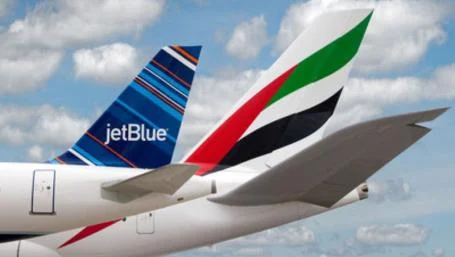Dubai-based Emirates has agreed to pay a $1.8 million settlement for operating JetBlue codeshare flights through Iraqi airspace at a flight level that was not approved by the U.S. FAA.
Emirates has U.S. Transportation Department (DOT) approval to operate codeshare flights with JetBlue, as long as these flights follow FAA restrictions, as though it were a U.S.-based airline.
However, between December 2021 and August 2022, Emirates operated 122 flights through Iraqi airspace below the U.S.-mandated minimum altitude of FL320. These 122 flights between the United Arab Emirates and the U.S. were performed by Emirates under JetBlue’s B6 flight designator.
“By operating these flights in this manner, Emirates violated the conditions of its authority to operate,” DOT said, announcing the $1.8 million settlement.
These flights were also in breach of an earlier DOT consent order, dated September 2020, which fined Emirates $400,000 for operating JetBlue codeshare flights through Iranian airspace that was closed to U.S. operators. This earlier ruling, which related to flights performed in July 2019, ordered Emirates to cease and desist from future violations.
Responding to the June 2024 ruling, Emirates said it planned to operate the 122 flights at or above FL320, but it could not secure air traffic control (ATC) clearance for this flight level. The airline said it would have been illegal for its pilots to fly above FL320 in these instances, jeopardizing the safety of other Baghdad flight information region (ORBB FIR) users.
“While these flights were operating, ATC did not give clearance to ascend to FL320, or had categorically instructed these flights to operate below FL320,” an Emirates spokesperson said. “Our pilots duly followed ATC instructions, a decision which is fully aligned with international aviation regulations.”
In its formal defense, Emirates said the flight plans were based on an altitude at or above FL320. Specific information about the ORBB FIR was provided in the crew briefing packs, and all flights ascended to FL320 as soon as they were cleared to do so. Emirates also sought to invoke an emergency situation exemption, based on the safety implications of refusing ATC instructions.
However, the DOT countered that Emirates “should have known” after the first few instances that local ATC might direct it to operate below FL320. “Emirates should and could have taken actions to avoid violating the condition of its codeshare statement of authorization but failed to do so,” the DOT said in its ruling.
The DOT stressed that the fine was for continuing to operate below FL320, and not for Emirates’ adherence to ATC instructions once in the air. After assessing all the evidence, the DOT concluded that enforcement action was warranted, particularly in light of the repeated violation.
Emirates said it had reached a settlement with the DOT over the “alleged breach.” The DOT has therefore ordered Emirates to pay $1.8 million “in compromise of civil penalties,” with $1.5 million payable within 60 days and the remaining $300,000 within one year.
This is not the first time a non-U.S. carrier has been fined for a codeshare violation. In January 2023, the DOT ordered UK long-haul carrier Virgin Atlantic to pay $1.05 million for operating Delta Air Lines codeshare flights over Iraq between March 2020 and October 2021 while a U.S. ban was in place. The codeshare flights were operating from London to India.
In its defense, Virgin said the overflight violations were inadvertent, caused by differing national requirements. Other authorities, including the UK, had continued to allow high-level overflight of Iraqi airspace. However, at the time, U.S. authorities did not permit Iraq overflight at any altitude.
Since October 16, 2020, the U.S. has had a NOTAM in effect, banning civil aviation operations below FL320 in the ORBB FIR. On Sept. 20, 2022, this restriction was extended to Oct. 26, 2024.


